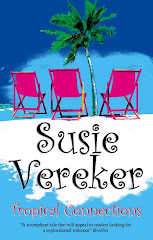England, 1911. When a free-spirited young woman arrives in a sleepy Berkshire village to work as a maid in the household of The Reverend and Mrs Canning, she sets in motion a chain of events which changes all their lives. For Cat has a past - a past her new mistress is willing to overlook, but will never understand . . .This is not all Hester Canning has to cope with. When her husband invites a handsome young man into their home, he brings with him a dangerous obsession...
During the long, oppressive summer, the rectory becomes charged with ambition, love and jealousy.
In 2011 Leah, a journalist visiting Belgium, is shown the body of a man who has lain in the ground since the First World War, but who is he and what do the letters he carries mean?
A gripping read with some excellent writing and fascinating characters. Former suffragette Cat, the maid with intelligence and ideas above her station, is particularly strong, Hester, too, is sympathetic as a more traditional young Edwardian woman married to a pallid young man. The vicar and his guest are interested in proving the existence of fairy spirits from another world, with disastrous consequences. Do please read it, and whatever else Katherine Webb writes. In this book she has tackled some strong underlying issues while writing a good story,
A Richard and Judy choice. (By the way, I think the pb cover has a white figure on it - can't be sure as I bought an ebook)
Lady Audley's Secret by Mary Elizabeth Braddon (1868) I enjoyed this melodramatic Victorian novel, the characters and insights into attitudes of the day.
Lucy Graham, a poor governess of unknown circumstances wins the heart of the rich Sir Audley. When Sir Audley's nephew comes to visit with his friend George, George goes missing, and the book quickly turns into a kind of action-packed detective story.
Various random minor points struck me: there’s a lot of ‘telling’ and long descriptions in a Victorian novel; plot points were heavily foreshadowed; the trains worked amazingly well in those days – the hero fair zipped about; early in the book Lady Audley was clearly marked as a baddy as she didn’t like dogs; the apparently lazy hero, in contrast, was obviously a goody because he adopted stray mongrels, though it wasn’t clear who looked after them when he was busy detecting; the child was unceremoniously dumped in a boarding school without protest at the age of 5. I thought perhaps Mary Elizabeth Braddon didn’t know much about children but I see she had 6 and wrote about 80 novels. But she may have had more freedom of action than Lady Audley. For further discussion of this book see the Cornflower Book Group









3 comments:
The Unseen sounds very interesting. I like time switches in books.
I think I was a bit more enthusiastic about Lady A. than you. I didn't think it was as melodramatic as the Brontes or Hardy. And I liked the bits of humor. I loved all the descriptions of both interiors and exteriors. Great comment about the dogs!
It is snowing here so I am enjoying staying warm and catching up with all my blogging friends and finding lots more titles to add to the wishlist. Thanks Susie.
I read "The Unseen" too. I got it as a Christmas present. Thoroughly enjoyed it, not least because, for me it is the best of both worlds - Historical and Contemporary.
Post a Comment